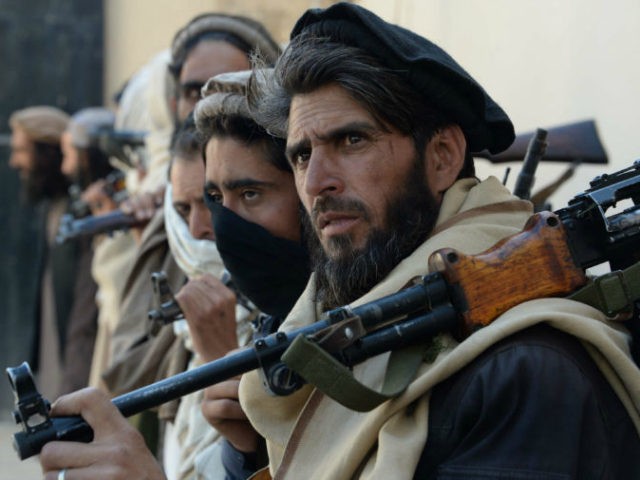U.S. Secretary of State Mike Pompeo said this week that President Donald Trump’s conditions-based strategy to end the nearly 17-year war in Afghanistan is “working,” slowing down the Taliban’s momentum on the battlefield and pressuring the group into realizing “they can’t win on the ground militarily.”
“Make no mistake, there’s still a great deal of work to do. That is certainly the case, and the American role will be important in this,” Pompeo acknowledged during a joint press conference in Kabul with Afghan President Ashraf Ghani on Monday.
“The president’s strategy is indeed working. … The strategy has sent a clear message … to the Taliban – they cannot wait us out – and we are beginning to see the results both on the battlefield where the Taliban’s momentum is slowing and in the prospects for peace with them,” the secretary told reporters.
Taliban jihadists assert they intend to fight until U.S.-NATO forces leave Afghanistan.
Ghani also noted that the U.S. strategy to end America’s most protracted war is showing signs of progress, telling Pompeo:
Please thank President Trump and the members of the U.S. national security team for their trust in the future of Afghanistan and for bringing a strategy that has been a game-changer. Mr. Secretary, the strategy is working. It has had significant impact. It is getting every actor and stakeholder engaged in the conflict around Afghanistan to recalculate, recalibrate, and think through the basic premise. … The objective of the strategy is to create the conditions for enduring peace and stability, and that’s what the Government of National Unity is committed to.
Asked to provide evidence that the strategy is working, Pompeo listed improvements among the Afghan National Defense and Security Forces (ANDSF), the Taliban’s realization that it cannot win on the battlefield, and the first-ever ceasefire during three days in mid-June, among other factors.
The secretary proclaimed:
An element of the progress is the capacity that we now have to believe that there is hope that many of the Taliban now see that they can’t win on the ground militarily. …W e saw the Taliban respond to the ceasefire that President Ghani put in place. These are linked issues.
The progress we’ve made in the South Asia strategy in increasing the size and the capability of the Afghan Security Forces, in strengthening the reforms inside the Afghan Government; the work that we have done to demonstrate to the Taliban that the continuation of fighting will lead them to a bad outcome, not one that’s in the best interests of the people in the regions where they operate – each of those are hallmarks of real progress.
Pompeo stressed that peace negotiations in Afghanistan must be Kabul-led. To no avail, Taliban leaders have insisted the United States negotiate directly with them.
The Trump administration has made reconciliation between Kabul and the Taliban the primary tenet of its Afghan strategy.
Ghani and Pompeo credited Trump’s South Asia strategy with bringing Kabul closer to a peace agreement with the Taliban.
The Afghan president attributed the historic ceasefire — a three-day truce at the end of Ramadan in mid-June — to Trump’s strategy.
President Donald Trump inherited chaotic conditions in Afghanistan from his predecessor.
Opium cultivation, heroin production, territory held by the Taliban, and the terrorist group’s manpower reached unprecedented proportions under former President Barack Obama’s watch.
The amount of territory held by predominantly Taliban terrorists has slightly increased further after President Trump unveiled his Afghan strategy in August 2017.
Taliban jihadists have continued to seize territory despite the Trump administration’s intensifying America’s military role in Afghanistan.
The U.S. Special Inspector General for Afghanistan Reconstructions (SIGAR), a watchdog agency that has been critical of what it described as the “failed” American efforts to stabilize Afghanistan, told National Public Radio (NPR) in May, “We have to give it [Afghan strategy] time to take effect.”
The Taliban generates the majority of its funding used to carry out violent terrorist attacks against the Afghans and the U.S.-NATO coalition from the cultivation and production of opium and its heroin derivative.
Politico recently learned from current and former U.S. officials that the historic levels of heroin production in Afghanistan had fueled the unprecedented opioid crisis that has killed tens of thousands of Americans.
In Afghanistan, the world’s top supplier of opium and heroin, poppy production has skyrocketed alongside the record number of fatal drug overdoses in the United States.

COMMENTS
Please let us know if you're having issues with commenting.